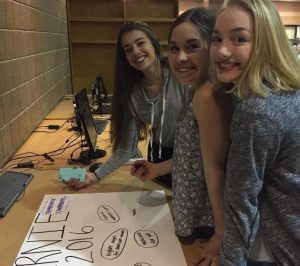Political tribalism, violence, effects of having far-right news on social media
Senior Michael Finch views Breitbart News’ Facebook page. In 2018, Wikipedia said Breitbart could only be allowed for opinion supports in their informative articles because of the reporting slant.
November 20, 2019
Breitbart News, during the heat of the 2016 presidential campaign, was one of the most trafficked news sources on the internet, behind Fox News. It is one of the farthest right news sites in the conservative mainstream. It has been marketed as a news source on Facebook, but is not allowed on Wikipedia for factual citations.
Far-right news has lead to startling real world consequences, such as the Christchurch, New Zealand shooting and the El Paso, Texas shooting.
Effects
Both shooters in those cases borrowed language from far-right news and far-right politicians. They both wrote manifestos, posted to far-right forums on social media, citing those they were to eventually kill as “invaders” of their country.
News on social media in general has changed the way news is consumed in this country. Facebook is coming out with their own news service to try and help people consume real news, and Twitter has removed any form of political ads on their platform.
The problems of fake news have led to a more tribal, politically charged society. According to journalism teacher Laurie Hansen, anyone can be fooled by fake news: smart people, ill-informed people, ill-educated people. The only way to make sure news is real is to “corroborate” and make sure “other media outlets are carrying the story.”
This politically charged society has not led to a partisan utopia, rather a dystopia. The federal government was shut down for 35 days because of a partisan disagreement. The shutdown was almost averted, with days to spare as well, but far-right commentators pushed President Donald J. Trump to keep pushing for his signature border wall. What ensued was the longest government shutdown in United States history.
The strong partisan views held by people today are not new. The difference between today and decades ago, politicians do not seem to be able to agree on the facts.
“The ramifications [of fake news is] a large populous, not being properly informed with both sides,” junior Evan Ekstrand said, who is an outspoken conservative. “This makes a large group of people being improperly informed and causes them to believe only one side is right.
Facebook, since it has grown in popularity, seems to have problems with harmful content being posted on their platform. While they physically cannot monitor every news post and addition to the timeline, they are trying.
Solutions
Facebook published three ideas about how they are trying to fight fake news on their platform. One, Facebook will take the monetized incentives out of political advertisements. Two, they started to build artificial intelligence to be able to, in the future, take down news sources. Finally, they said they would work with the Walter Cronkite School of Journalism and Mass Communications to help build a transparent and trustworthy platform for their AI.
This method goes directly into what social media manager for the student council, Jenna Yingling, said: “I would make sure there is a policy to eliminate all ‘fake news.’”
The problem of politically left bias when it comes to monitoring social media posts has been a substantial issue flagged by prominent, and regular, conservatives alike.
“The right wing has grown to dislike (…) Facebook due to left bias,” junior, and outspoken conservative on social media platforms, Emalee Johnson said. “However, many people on the left wing [supports] their actions,”
Twitter, one of the biggest social media companies in Silicon Valley, also went the same direction as Facebook when it announced recently no political ads will be allowed on their platform.
Not all agree, however, these regulations should be implemented. Hansen thinks social media “should be seen as more entertainment or a jumping off point to go search” for more.
Ekstrand says social media should only “regulate news sources” only when “it directly breaks the law.”
Fake news is a rampant problem on social media, and one that is not likely to go away any time soon. Fake news, once realized is fake, makes readers feel “betrayed” and “lied directly to.”
While steps have been taken to address the problem, most social media companies do not know how to remedy the situation, and the problem will only become worse.
“Politicians who cry ‘fake news’ when they read something they simply do not agree with” will only become more pervasive. Politicians who cannot agree because of their misinformed constituents and hyper partisan requests will become the norm. Unless social media companies change their policies, or we as a public decide “to educate [ourselves] and read and critically think,” said Hansen.












Austin Fierro • Dec 18, 2019 at 8:20 pm
I thought you made a wise choice in interviewing conservative-leaning students so as to not cause the article to be too left-leaning. Great job showing both sides of the argument while still getting the main point across.
Sandra Liu • Dec 8, 2019 at 3:57 pm
This article was very interesting to read. You did a great job of connecting your points to real-world, impactful events. I also really liked how you easily could have interviewed more left-leaning students, but instead you did a wonderful job of using sources from the conservative viewpoint to incorporate both sides. That really served to strengthen your argument and make the article engaging.